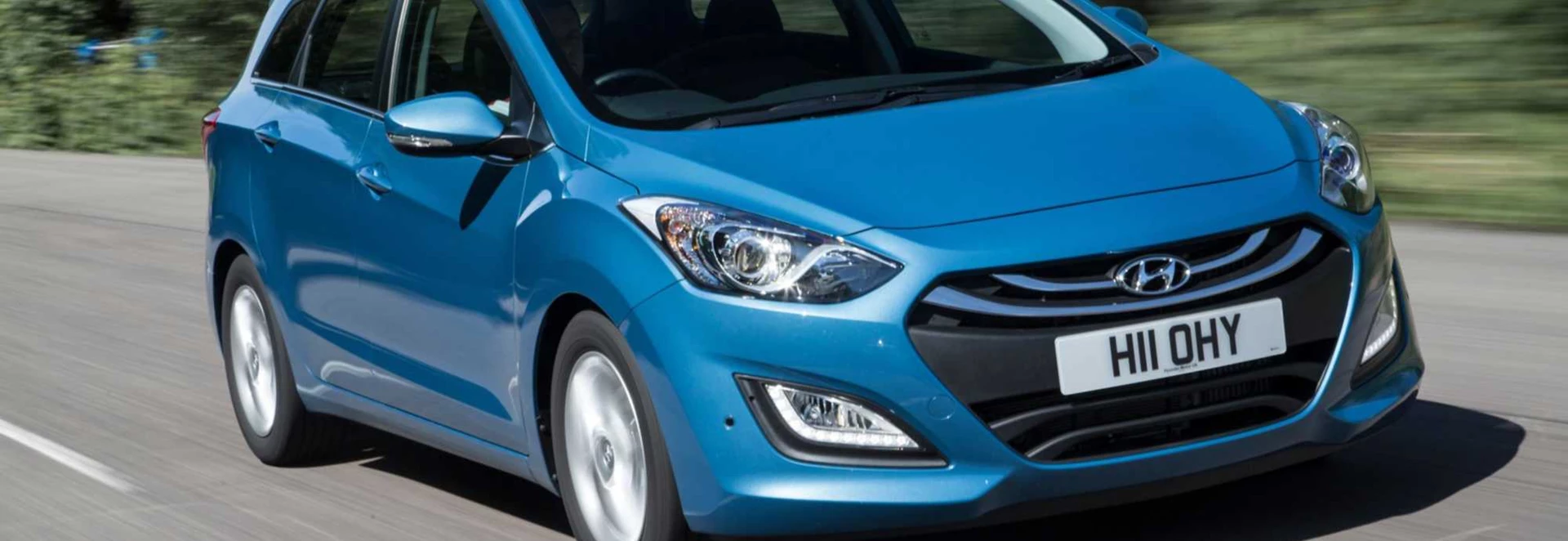The Tourer is the third body style in the i30 range after the three and five-door hatchbacks which were introduced slightly earlier back in 2012. In the interests of maximising load space it's more than seven inches longer than either of them, and in terms of practicality it's very competitive against other medium-sized estates.
There are three 1.6-litre engines in the range. The 118bhp petrol unit being flanked by CRDi diesels producing 109bhp and 126bhp, the last of these being the only engine available in the top three of the five trim levels. No matter which engine you pick there's a choice of manual and automatic transmission, the latter adding a little over £800 to the price of the car.
Performance
Hyundai has seen no reason to put a really quick i30 Tourer on sale, and even the more powerful cars take 11.2 seconds to accelerate from 0-62mph if they have a manual gearbox. The 109bhp diesel does the same job in 11.8. All are slightly slower than their hatchback equivalents, and automatic transmission dulls their performance still further. Top speeds are in the 110-120mph range.
The petrol engine is very quiet in normal driving, but it has to be worked hard to keep up with the diesels. Maximum power isn't achieved until you're revving to 6300rpm, and who's going to bother doing that? The diesels feel much more potent for most of the time, and they can be left in the same gear in conditions which would oblige you to drop one or even two in the petrol car.
Ride and Handling
Few cars of this type are so enjoyable to drive in such a wide variety of conditions.
While the pace of the Hyundai i30 Tourer is not really worth shouting about, the ride and handling does impress, with the petrol Tourer the star performer in this area. With its lighter engine, and especially on the small steel wheels fitted to the base model, it rides very well and handles beautifully when being pushed hard on a difficult country road. It's also very easy to manoeuvre in town, and despite being quite low-geared it cruises peacefully. The diesels can't quite match it, but they're still very good. Few cars of this type are so enjoyable to drive in such a wide variety of conditions.
Interior and Equipment
Although Hyundai is Korean, the i30 Tourer was designed in Germany and is built in the Czech Republic.
The extra length of the Tourer compared with the hatchbacks means that luggage capacity is 150 litres greater at 528 litres if you keep the rear seats in place. Fold them down (they don't quite go flat, but nearly) and this rises to 1,642 litres up to roof level. These are not unbeatable figures in the class, but they are very good. The tailgate opening extends right down to the boot floor, which makes access very easy. So why only three stars? Because you can't see out of the car. The windscreen pillars are so thick that you have to be extremely careful at junctions, and reversing is especially tricky. There are no parking sensors on the entry-level classic, but there's one at the front of the Active, while the Style, Style Nav and Premium have them at both ends. The last two also have a rear-facing camera, which frankly should be standard on all of them. All versions have Bluetooth connectivity with voice recognition, audio and phone controls mounted on the steering wheel, USB and auxiliary connections and a trip computer, though none of them have DAB digital radio. Cruise control and variable power steering assistance are fitted to all except the Classic, and satellite navigation is standard on the Style Nav (hence the name) and Premium.
Cost
Pricing starts at under £17,000, and you can't spend as much as £25,000 without delving into the list of optional extras.
With manual transmission, the 109bhp diesel has CO2 emissions of 110g/km and the 126bhp version is rated at 115g/km (or 117g/km for the Premium, which has larger wheels), so Vehicle Excise Duty will cost £20 and £30 per year respectively. The other models lag behind quite dramatically, the best figure among them being the 149g/km (equating to £145 per year in VED) shared by both diesels. Official fuel economy for the 109bhp diesel manual is 67.3mpg. The petrol manual doesn't beat 40mpg by much on the EU test cycle and is unlikely to get near that in the real world. Then again, you can have an i30 Tourer for not much money if you want the petrol engine and don't mind a relatively low specification. Pricing starts at under £17,000, and you can't spend as much as £25,000 without delving into the list of optional extras. Like other Hyundais, the i30 Tourer has a transferable five-year, unlimited mileage warranty, along with five years' worth of roadside assistance and annual health checks. There's also an optional fixed price servicing plan, costing between £349 and £749 depending on which car you're talking about and how long you want the plan to run.
Our Verdict
It's odd to think that not long ago Hyundai made cars whose main appeal was that they were cheap. The rise in design and quality since then has been prodigious, and the i30 Tourer demonstrates that as well as any other current model. The lack of visibility, particularly at the rear, is a frustrating issue, however, and ought to be addressed quickly. Apart from this issue though, it's difficult to fault the car for practicality, and the driving experience is comfortable. There's a lot to be said for the base model if you value good handling, or if you don't go on long journeys very often, though the financial case for the diesels is stronger.




